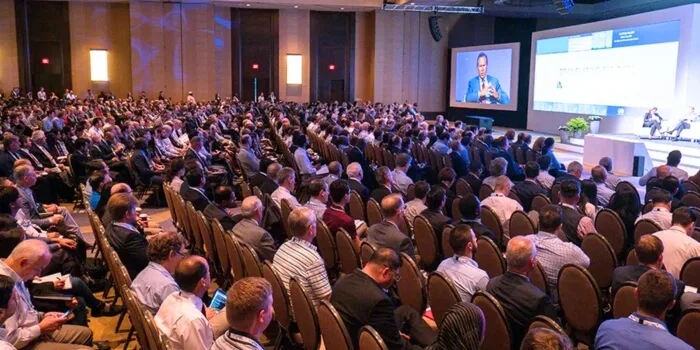Conferences are an effective treasure of knowledge, bringing together experts and enthusiasts from various fields to share insights and experiences. However, while many attendees benefit from these gatherings, some might wonder about the potential drawbacks associated with attending or hosting them. You may ask, “What are the disadvantages of conference?”
One significant disadvantage is the financial cost they charge. Registration fees, travel expenses, and accommodation costs can add up quickly, making it challenging for individuals or organizations on tight budgets to participate. Additionally, conferences require a considerable time commitment, often spanning several days and leading to difficulties balancing work or personal responsibilities.
Still curious about the full range of disadvantages conferences may present? If so, read on to discover valuable insights about this topic and learn how to overcome conference challenges effectively.
What Is a Conference?
An event that brings together professionals to exchange ideas, network, and gain insight into their respective fields is a conference. These events typically feature a diverse array of presentations, workshops, and panel discussions covering various topics of interest.
The audience includes industry experts as well as aspiring professionals seeking new knowledge and opportunities for growth. By attending a conference designed by a trusted event organizer, you will have the chance to network with thought leaders, share your expertise, and collaborate on innovative solutions.
These gatherings promote a sense of community and teamwork among like-minded individuals, driving collective progress and advancement in their respective industries. However, it’s essential to acknowledge the disadvantages of conference, such as potentially high costs and time commitments. Even so, the benefits of these events often outweigh the challenges, making them invaluable for networking and collaboration.
What Are the Types of Conferences?
Conferences play a vital role in various sectors, serving as platforms for knowledge sharing, networking, and professional development. The events bring people from diverse backgrounds together, promoting collaboration and innovation while addressing unique challenges. Depending on the purpose of the conference, there are different types.
Industry Conferences
These conferences focus on specific sectors such as technology, healthcare, or finance. They bring together professionals to discuss the latest trends, innovations, and challenges in their respective fields. Attendees can network with industry leaders, attend workshops, and gain insights to stay informed of industry developments.
Academic Conferences
A wide range of topics are discussed at academic conferences, where scholars, researchers, and academics present papers and engage in intellectual discourse. These events boost collaboration, facilitate peer review, and contribute to the advancement of knowledge in various academic disciplines.
Trade Shows and Expos
The purpose of trade shows and expos is to showcase products, innovations, and services within specific industries, and to connect exhibitors with potential customers, partners, and investors. Attendees have the opportunity to explore the latest advancements, participate in product demonstrations, and engage in business-to-business networking.
Professional Development Conferences
The main focus of professional development conferences is to improve the skills and knowledge of professionals in specific fields or industries. They offer workshops, seminars, and training sessions designed to help attendees improve their skills, advance their careers, and stay updated on industry best practices.
Networking Conferences
During networking conferences, attendees build relationships and facilitate connections. These events provide ample opportunities for networking through structured networking sessions, social events, and one-to-one meetings, helping participants expand their professional networks and forge valuable connections.
Virtual Conferences
With advancements in technology, virtual or hybrid conferences have gained popularity, allowing attendees to participate remotely from anywhere in the world. These events use virtual platforms to host keynote speeches, panel discussions, and interactive sessions, offering a convenient and cost-effective alternative to traditional in-person conferences.
These are just a few examples, but the landscape of conferences is vast and diverse, catering to a wide range of interests, industries, and objectives. It’s crucial to know and avoid predatory conferences, which can take advantage of the academic and professional needs for visibility and recognition.
Is Attending a Conference Good?
Taking part in a conference can offer unique opportunities for personal and professional development. Participants often are immersed in a dynamic environment filled with new ideas and diverse perspectives. Engaging with others in this setting can lead to valuable connections and insights.
- Conferences provide access to industry experts who share their knowledge and experiences, allowing attendees to learn from the best in their fields.
- Networking opportunities abound, enabling participants to meet like-minded individuals and build professional relationships that may lead to future collaborations.
- Attendees can participate in workshops and sessions tailored to their interests, enhancing their skills and broadening their understanding of various topics.
- Having access to new ideas and innovations can inspire attendees to think creatively and implement fresh approaches within their own work environments.
- Engaging in discussions and sharing insights with peers fosters a sense of community, promoting collaboration and support among professionals in similar fields.
- Participants often gain access to exclusive resources, such as research papers and industry reports, which can enhance their knowledge and expertise.
- Conferences can serve as a platform for showcasing one’s work and providing valuable feedback and recognition from peers and industry leaders.
- This experience can significantly influence personal growth and career advancement, contributing to overall professional development.
What Are the Disadvantages of Conference?
Attending a conference can be beneficial as it provides opportunities for networking, learning, and professional development. It also comes with drawbacks such as cost, time commitment, and potential information overload and most disadvantages are available with the right strategy.
Financial Strain
Conferences can be costly events, with expenses such as registration fees, travel costs, and accommodation. For individuals or organizations on a tight budget, these financial burdens can be significant, making it harder to access valuable networking and learning experiences.
Time Commitment
Attending conferences often requires several days of dedicated time away from regular work or personal obligations. This time commitment can create challenges in balancing conference participation with other responsibilities, leading to feelings of stress and possible burnout due to overwhelming demands.
Crowded Venues
There can be thousands of attendees at conferences, resulting in crowded venues that may seem chaotic. Finding your way through packed spaces can be difficult, and competing for attention can limit opportunities for meaningful connections or engaging conversations with speakers and exhibitors.
Information Overload
The abundance of information presented at conferences can lead to information overload. Attendees may find it hard to process and retain important insights due to multiple sessions running at the same time. Prioritizing relevant content becomes a struggle in such a busy environment.
While conferences offer valuable opportunities for learning, networking, and professional growth, it’s important to recognize the potential drawbacks. By being aware of these challenges, attendees can take proactive steps to enhance their overall conference experience.
How To Avoid the Disadvantages of Conferences?
Everything has benefits and drawbacks, and hosting or joining a conference is no different. You will experience some benefits and drawbacks from a conference too. However, with a proper strategy, you can avoid the disadvantages. Here are some tips to avoid conference disadvantages:
- Plan Ahead: Review the conference agenda in advance and prioritize sessions and activities aligned with your interests and goals.
- Budget Wisely: Set a budget for registration fees, travel, and accommodation, and look for cost-saving opportunities such as early bird discounts. Understanding your company’s pay policies for employees attending conferences can help you manage expenses effectively.
- Take Breaks: Schedule regular breaks between sessions to recharge and prevent stress, allowing time for reflection and relaxation.
- Network Strategically: Be intentional about networking by identifying key contacts beforehand and reaching out to them proactively.
- Stay Organized: Keep track of important information and contacts using a notebook or digital app to avoid feeling overwhelmed.
- By implementing these strategies, you can maximize the value of your conference attendance while minimizing potential drawbacks.
Frequently Asked Questions
While conferences bring numerous opportunities for growth and connection, they also come with a set of challenges that can affect participants. Below, we explore some lesser-known drawbacks that can impact your conference experience.
How Can Language Barriers Impact Conference Attendees?
Language barriers can significantly hinder the exchange of information at international conferences. Attendees who are non-native speakers may find it difficult to fully engage with presentations or networking opportunities, which can limit their learning and interaction potential.
What Are the Environmental Impacts of Hosting Conferences?
Conferences can have a large environmental impact due to travel, energy use, and waste production. The carbon footprint from air travel, the energy needed for venue operations, and the waste generated from conference materials contribute to environmental concerns.
Can Over-Specialization in Conference Topics Be a Disadvantage?
Yes, conferences that focus too narrowly on specialized topics may turn off broader audiences or newcomers who are looking to gain a foundational understanding of the subject. This can reduce the availability and accessibility of valuable information and networking opportunities.
How Does Lack of Personalized Interaction Affect Conference Outcomes?
In large conferences, the high number of participants can limit personalized interaction, making it challenging to form meaningful connections or engage deeply with content. This can lead to a less satisfying experience for those looking for personalized engagement or specific guidance.
What Are the Security Concerns at Large Conferences?
The security of large conferences is often a concern, ranging from data theft to physical safety concerns. The concentration of people, coupled with high-profile speakers and attendees, increases the risk of security breaches, requiring significant measures to ensure safety and privacy.
Conclusion
After exploring the potential drawbacks of conferences, it’s clear that while these events offer valuable opportunities for learning, networking, and professional development, they also come with challenges.
So, now you know: What are the disadvantages of conference? And by implementing some smart strategies, such as budgeting wisely, prioritizing sessions, and taking breaks to recharge, you can even mitigate them, and make the most of your conference experience.
In the end, balancing the benefits and drawbacks of attending conferences requires a thorough understanding of their complexities and the differences that exist between them.








